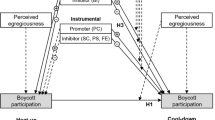Abstract
Previous research suggests that when consumers encounter discrepant prices due to dynamic pricing, a social comparison evokes stronger unfairness perceptions than a temporal comparison does. In this paper, the authors show how this effect may vary depending on consumers’ self-construal. Two experiments find that while independent consumers perceive stronger price unfairness when paying more than other consumers, interdependent consumers perceive stronger price unfairness when paying more than what they did in the past. These effects occur because consumers are differentially sensitive, as a function of their self-construal, to social versus temporal comparisons in their self-appraisal. Our results show that self-construal affects consumers’ means for maintaining their self-appraisal and alters the relevance of different comparison targets in price unfairness perceptions.



Similar content being viewed by others
Notes
Smartphone is a frequently purchased product among our study participants. According to a report conducted by Deloitte in 2016, 51% of Chinese consumers purchased smartphones online, and 79% of them changed smartphones more than once every year (https://www2.deloitte.com/cn/en/pages/technology-media-and-telecommunications/articles/2016-global-mobile-consumer-survey-china-edition.html).
References
Aaker JL, Lee AY (2001) I seek pleasures and we avoid pains: the role of self-regulatory goals in information processing and persuasion. J Consum Res 28(1):33–49
Adams JS (1965) Inequity in social exchange. Adv Exp Soc Psychol 2:267–299
Albert S (1977) Temporal comparison theory. Psychol Rev 84(6):485–503
Bolton LE, Keh HT, Alba JW (2010) How do price fairness perceptions differ across culture? J Mark Res 47(3):564–576
Chen H, Bolton L, Ng S, Lee D, Wang D (2018) Culture, relationship norm, and dual entitlement. J Consum Res 45(1):1–20
Chiu CY, Hong YY, Dweck CS (1997) Lay dispositionism and implicit theories of personality. J Pers Soc Psychol 73(1):19–30
Cross SE, Madson L (1997) Models of the self: self-construals and gender. Psychol Bull 122(1):5–37
De Bruyn A, Bolton GE (2008) Estimating the influence of fairness on bargaining behavior. Manag Sci 54(10):1774–1791
Festinger L (1954) A theory of social comparison processes. Hum Relat 7(2):117–140
Gardner WL, Gabriel S, Lee AY (1999) I value freedom but we value relationships: self-construal priming mirrors cultural differences in judgment. Psychol Sci 10(4):321–326
Haws KL, Bearden WO (2006) Dynamic pricing and consumer fairness perceptions. J Consum Res 33(3):304–311
Hayes A (2018) Introduction to mediation, moderation, and conditional process analysis: a regression-based approach. The Guilford Press
Heine S, Lehman DR, Markus HR, Kitayama S (1999) Is there a universal need for positive self-regard? Psychol Rev 106(4):766–794
Heine S, Kitayama S, Lehman DR, Takata T, Ide E, Leung C, Matsumoto H (2001) Divergent consequences of success and failure in Japan and North America: an investigation of self-improving motivations and malleable selves. J Pers Soc Psychol 81(4):599–615
Heine S, Lehman DR (1995) Cultural variation in unrealistic optimism: does the west feel more vulnerable than the east? J Pers Soc Psychol 68(4):595–607
Hong J, Chang HH (2015) I follow my heart and we rely on reasons: the impact of self-construal on reliance on feelings versus reasons in decision making. J Consum Res 41(6):1392–1411
Hong YY, Morris MW, Chiu CY, Benet-Martinez V (2000) Multicultural minds: a dynamic constructivist approach to culture and cognition. Am Psychol 55(7):709–720
Jin L, He Y, Zhang Y (2014) How power states influence consumers' perceptions of price unfairness. J Consum Res 40(5):818–833
Kemmelmeier M, Oyserman D (2001) The ups and downs of thinking about a successful other: self-construals and the consequences of social comparisons. Eur J Soc Psychol 31(3):311–320
Lalwani AK, Shavitt S (2009) The “me” I claim to be: cultural self-construal elicits self-presentational goal pursuit. J Pers Soc Psychol 97(1):88–102
Li KJ, Jain S (2015) Behavior-based pricing: an analysis of the impact of peer-induced fairness. Manag Sci 62(9):2705–2721
Major B (1994) From social inequality to personal entitlement: the role of social comparisons legitimacy appraisals and group membership. Adv Exp Soc Psychol 26:293–293
Major B, Testa M (1989) Social comparison processes and judgments of entitlement and satisfaction. J Exp Soc Psychol 25(2):101–120
Markus HR, Kitayama S (1991a) Culture and the self: implications for cognition emotion and motivation. Psychol Rev 98(2):224–253
Markus HR, Kitayama S (1991b) Cultural variation in the self-concept. In The self: interdisciplinary approaches (pp.18–48). Springer New York
Myers D (1987) Social psychology (2nd ed). McGrawHill, New York
Ross M, Wilson AE (2000) Constructing and appraising past selves 8, Memory brain and belief. 231–258. Cambridge, MA: Harvard University Press
Svenson O (1981) Are we all less risky and more skillful than our fellow drivers? Acta Psychol 47(2):143–148
Takata T (1987) Self-depreciative tendencies in self-evaluation through social comparison. Jpn J Exp Soc Psychol 27(1):27–36
Trafimow D, Silverman ES, Fan RMT, Law JSF (1997) The effects of language and priming on the relative accessibility of the private self and the collective self. J Cross Cult Psychol 28(1):107–123
Trope Y, Liberman N (2010) Construal-level theory of psychological distance. Psychol Rev 117(2):440–463
Wilson AE, Ross M (2001) From chump to champ: people's appraisals of their earlier and present selves. J Pers Soc Psychol 80(4):572–584
Wood JV (1989) Theory and research concerning social comparisons of personal attributes. Psychol Bull 106(2):231–248
Wu EC, Cutright KM, Fitzsimons GJ (2011) How asking “who am I?” affects what consumers buy: the influence of self-discovery on consumption. J Mark Res 48(2):296–307
Xia L, Monroe KB, Cox JL (2004) The price is unfair! A conceptual framework of price fairness perceptions. J Mark 68(4):1–15
Zell E, Alicke MD (2009) Self-evaluative effects of temporal and social comparison. J Exp Soc Psychol 45(1):223–227
Zhang J (2009) The effect of advertising appeals in activating self-construals: a case of bicultural Chinese generation X consumers. J Advert 38(1):63–82
Author information
Authors and Affiliations
Corresponding author
Ethics declarations
Conflict of Interest
The authors declare that they have no conflict of interest.
Rights and permissions
About this article
Cite this article
Dou, W., Lu, W., Wang, D. et al. I Paid More than You (Before)?! The Effects of Self-Construal and Comparison Target on Price Unfairness Perceptions. Cust. Need. and Solut. 7, 12–18 (2020). https://doi.org/10.1007/s40547-019-00096-z
Published:
Issue Date:
DOI: https://doi.org/10.1007/s40547-019-00096-z




